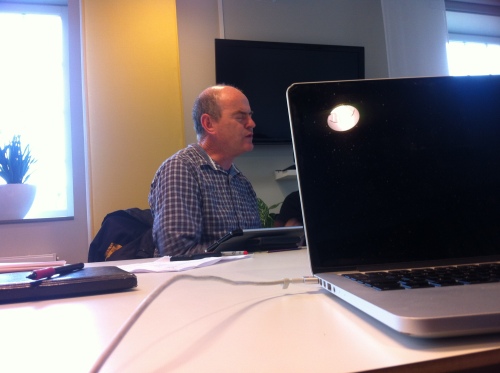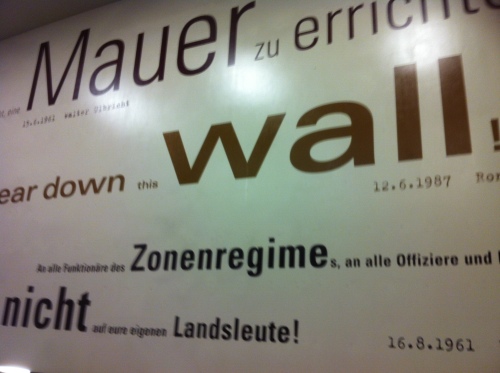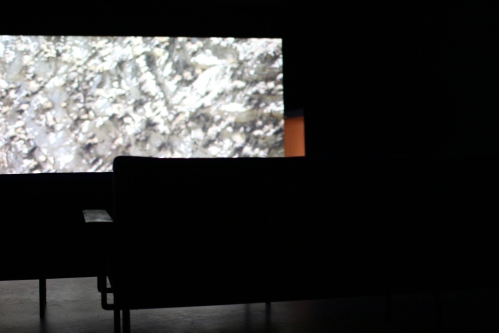Past or Post Human?
by johangardebo
There is something about being posthuman that appeals to me, who would not want to go beyond previous categories of “The Human”? But would the term “posthuman” makes sense 5-10 years from now? “Posthuman…”, the future posthumanist reflects, “…that is such a thing of the past.” But then again, this is not the point of departure for posthumanist discourses today – the term may well serve fruitful discussions where we are at the moment, to which I now turn.
The Norrköping Workshop on Posthumanities 15-16 October brought people and thoughts together from various strands of the humanities, material, environmental, posthuman. The point here is not the different points of departure but the juncture at which we met, which was and still is how to engage with humans in a rapidly changing environment of which we are both co-causing and co-becoming with.
Planning non-anthropocentric cities
Jonathan Metzger sough to analyse the co-becoming of humans in cities, and raised here the issue of safeguarding against irony (remaining in theory) but to get hands dirty with sincerity (put ideas into a practice).
Regardless of if theory is ironic or not, what is a study of environment meant to achieve, except greater analytical clarity of causality? Is there ethics in environment? Metzger retorted, paraphrasing Martin Luther King Jr.’Arc of the moral universe’ “[thus far] it does not appear as the arc of the universe has bent toward justice”. The assumption that life should keep going for its own stake (if we do away with the self-worth of Anthropocentrism) seem a strategic essentialism. Be that human rights, value-systems, nations, humanism…
Jonathan Metzger: What we can gain is the capacity to ‘fail better’
Tim Le Cain: Well Jonathan, we risk to ‘fail catastrophically’, but we must still act and envision alternatives to the modernist world
Must we be critical to any formulation about nature as simply “there”? At one of his Gifford lectures, Bruno Latour had begged for an ecological war, referring to the need to see that evocations of nature are political, and should thereofre be politicized. The Norrköping symposium had the spectre of Latour hanging over it, offering hybridity and politics of things as an escape of exceptionalist humanity. Young men march off to fight old men’s war, and never fight old battles (Science wars?) to win new ones ((The Anthropocene?). A caveat, according to Ian Hacking, ‘war’ is best kept far away from academic debate and discourse as it has absolutely no parallell to the real thing, which is what we really should be worried about.
Remotely distant
When getting to the history of remote sensing satellites, the immediate question was: “What is remote about it?” ‘Remote sensing’ is perhaps an oxymoron, how can a thing be sensed at a distance? The posthumanistic approach would be to ground sensing in tacit practices and components, the materials and equipment, the satellite payload, where it came from and how it eventually got into space, along with the areas for downlinking.
In hindsight, I think this approach might be close to what Armin Reller and Jan Zalasiewicz have elaborated as technostratigraphy, asking three things of a thing:
- Of what materials is a thing made?
- Where does these materials come from?
- What are the politics (re)assembling these materials at a specific points in time into a thing?
In short, what human practices and powers bring metals from the ground into polar-orbit in space?
Matters of Culture
Being part of Tim Le Cains upcoming work on material history (and new materialism), not too much should be given away beforehand. Except this: the work was first planned to bridge theory and empirical studies. However, the theory-part outgrew its limits and eventually became the piece in its entirety, an irony of wich Le Cain is all-to-aware of in this critique of empiricism.
What I found thought-provoking was the supposed Anthropocentrism of SCOT, namely the assumption that artefacts (technology) are distinct from culture, which new materialism challenges. Only seeing society as shaping technology, and not the other way around, is to operate at levels of abstraction (and determinism) that obscures as much as reveals. How would the cultural turn define history?
society = people without things– Tim Le Cain on The Cultural Turn
Le Cain sees the goal of neo-materialism as an attempt “to escape the dangerous delusion that humans chart our course alone, limited only by our imagination and our will to triumph….[neither is it] to find the decline of the Roman Empire in a lead pipe or the kingdom lost for want of a horse.”
Life in Transaction
Although useful for future work, some of the most thought-provoking things were raised by Owain Jones, starting out with his loathing for historical novels.
Humans were different things before. I do not believe in historical novels, those were almost like alien creatures – Owain Jones
If things are truly this contingent in the human constituancy, what is continuous and worth progressing? The new ideas Owain outlined are feminism and ecologism for developing politics of degrowth, representational rights and dialogue. This is not to say that feminism is more dialogical than the masculine (which could also be contingent in history) but that feminism at this stage calls for dialogue on what is relevant within human societies at present.
My reaction to this is how you build momentum (assuming that momentum requires progression along a trajectory) if so much of past humans are alien (different from ‘us’) and also that the political movements on one hand pursues equity within the human species, the other without it.
Roadmap towards posthumanities
Environment is the game changer – we must work with materiality
Think pragmatically about Environment – keep doing the humanities but with other than the human condition
Matter is active and self-productive – humans ‘become’, rather than ‘is’, products of a material world
Start simple – stop talking so much about humans
There is so much more that could be said about the Norrköping workshop, Martin Hultman’s “Flow of WELGAS” and Jennie Olofsson’s illustration of how ‘technological illiteracy’ leads to e-waste. I hope to have summed up some of their merits in the roadmap. As for writing a technostratigraphy of remote sensing satellites, it would do well to learn from the challenges of tracing a technology when this runs up against the practices of reassembly and disassembly (how do you track e-waste that upon recycling is broken down into individual metals and removed from public view by corporate regulations?).




